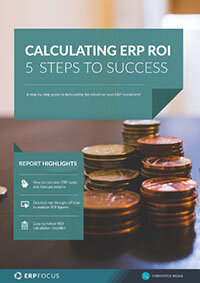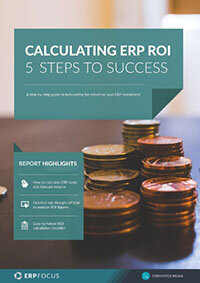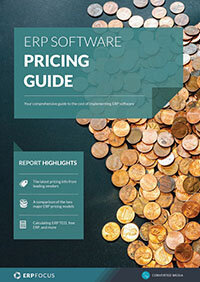ERP ROI: Proving Financial Payback will Make you a Star
Calculating financial benefits resulting from ERP requires a strong knowledge of business process, a reasonable understanding of accounting (what sorts of savings affect what lines on the income statement and the balance sheet), and a grounded philosophy on how liberal or conservative you are on savings estimates.
Business process knowledge is essential, because it is in the ways that ERP will change the business that financial benefits and ERP ROI are realized. Suppose you cannot handle any export business today, because your legacy software does not support transactions and taxes in a foreign currency. If ERP allowed you to change that, then realistically, all forecast business margin from exports could be justifiably attributed to ERP. But, what if you were at full capacity and exporting simply took away from domestic sales? Then you could not realistically claim margin increase. It takes business process knowledge to understand that, and to detail the cause and effect chains. In the course of ERP requirements gathering, you and your team should have acquired a list of five to ten really prevalent “pain points” – things that are problematic across all divisions, all global locations. Concentrate on what the opportunity cost (or potential savings) of these pain points are, because these are really the big things you are trying to fix. What is the cost of inefficient scheduling, order entry errors, inefficient subcontracting management, or taking five days to conduct a monthly financial closing? You have to understand how your company makes money, and equally important, the things you might do with ERP software to make more money.
Uncovering the Intangibles
Become knowledgeable about the losses almost all companies have that detract from profit: yield (aka, working loss), off quality, efficiency, inventory obsolescence, % leads resulting in sales, warranty claims and returns, and manufacturing variances. Any real improvement in these categories as a result of ERP will make a significant positive impact on the income statement.
Try to enlist some respected financial help with these calculations. Some financial categories – like revenue, or variances, are subject to influence from dozens of initiatives, and accurately attributing the effects of ERP requires consensus building from the financial community that the assumptions are valid. An unsubstantiated claim of “5% efficiency improvement in sales time” feels like something pulled out of the air; “elimination of thirty minutes a day of administrative work per day by salespeople” is very credible, assuming you can specify what you are eliminating. Financial people are good about forcing claims towards the latter example.
Giving a fair, realistic assessment of the financial payback of ERP software will do wonders for your credibility with your executive sponsors. If the financial benefits are not compelling, and you cannot successfully argue the intangibles, you have to be prepared for the possibility that the ERP project may not go forward. If it does go forward, they will see you as someone who neither sugar coats information, nor cries “Wolf!”, but rather, presents the truth in the most professional manner possible.
Free white paper

Calculating ERP ROI: 5 steps to success
Calculate your new ERP's financial benefits with this comprehensive guide

Featured white papers
Related articles
-
![Three direct links between ERP and manufacturing revenue [image by Snowing on Freepik] Three direct links between ERP and manufacturing revenue [image by Snowing on Freepik]](/pictures/W1siZiIsIjIwMjUvMDEvMjAva2ZwYjAzb3gzX1RocmVlX2RpcmVjdF9saW5rc19iZXR3ZWVuX0VSUF9hbmRfbWFudWZhY3R1cmluZ19yZXZlbnVlX2ltYWdlX2J5X1Nub3dpbmdfb25fRnJlZXBpa18uanBnIl0sWyJwIiwidGh1bWIiLCI0MDB4MjY2IyJdLFsicCIsImVuY29kZSIsImpwZyIsIi1xdWFsaXR5IDg1Il1d/Three%20direct%20links%20between%20ERP%20and%20manufacturing%20revenue%20%5Bimage%20by%20Snowing%20on%20Freepik%5D.jpg?sha=b45b02a140cc8680)
Three direct links between ERP and manufacturing revenue
What you need to know to help you achieve a return on your manufacturing ERP investment
-

Secret KPI: Why Your ERP Implementation Team Matters More Than Software
Learn how Godlan ensures successful ERP implementation for manufacturers with proven strategies &...
-
![3 Tips for Achieving Buy-In for Your ERP Integration [by pressfoto on Freepik] 3 Tips for Achieving Buy-In for Your ERP Integration [by pressfoto on Freepik]](/pictures/W1siZiIsIjIwMjQvMTAvMjkvNnQyNmRwdzdwYl8zX1RpcHNfZm9yX0FjaGlldmluZ19CdXlfSW5fZm9yX1lvdXJfRVJQX0ludGVncmF0aW9uX2J5X3ByZXNzZm90b19vbl9GcmVlcGlrXy5qcGciXSxbInAiLCJ0aHVtYiIsIjQwMHgyNjYjIl0sWyJwIiwiZW5jb2RlIiwianBnIiwiLXF1YWxpdHkgODUiXV0/3%20Tips%20for%20Achieving%20Buy-In%20for%20Your%20ERP%20Integration%20%5Bby%20pressfoto%20on%20Freepik%5D.jpg?sha=0e1a55a6cfcac344)
3 tips for achieving buy-in for your ERP integration
Read our expert’s tips on getting your ERP integration project off the ground by achieving busine...


